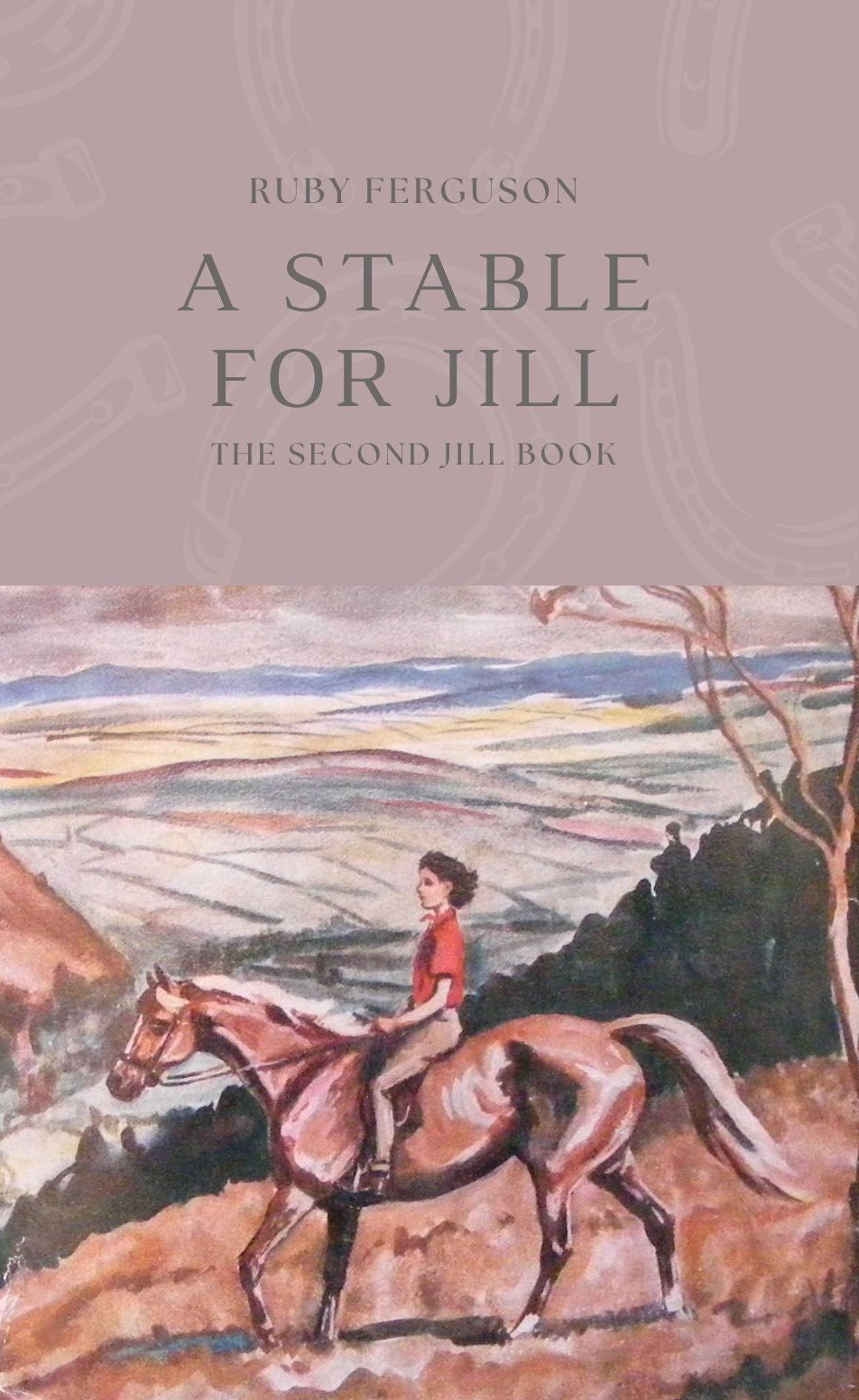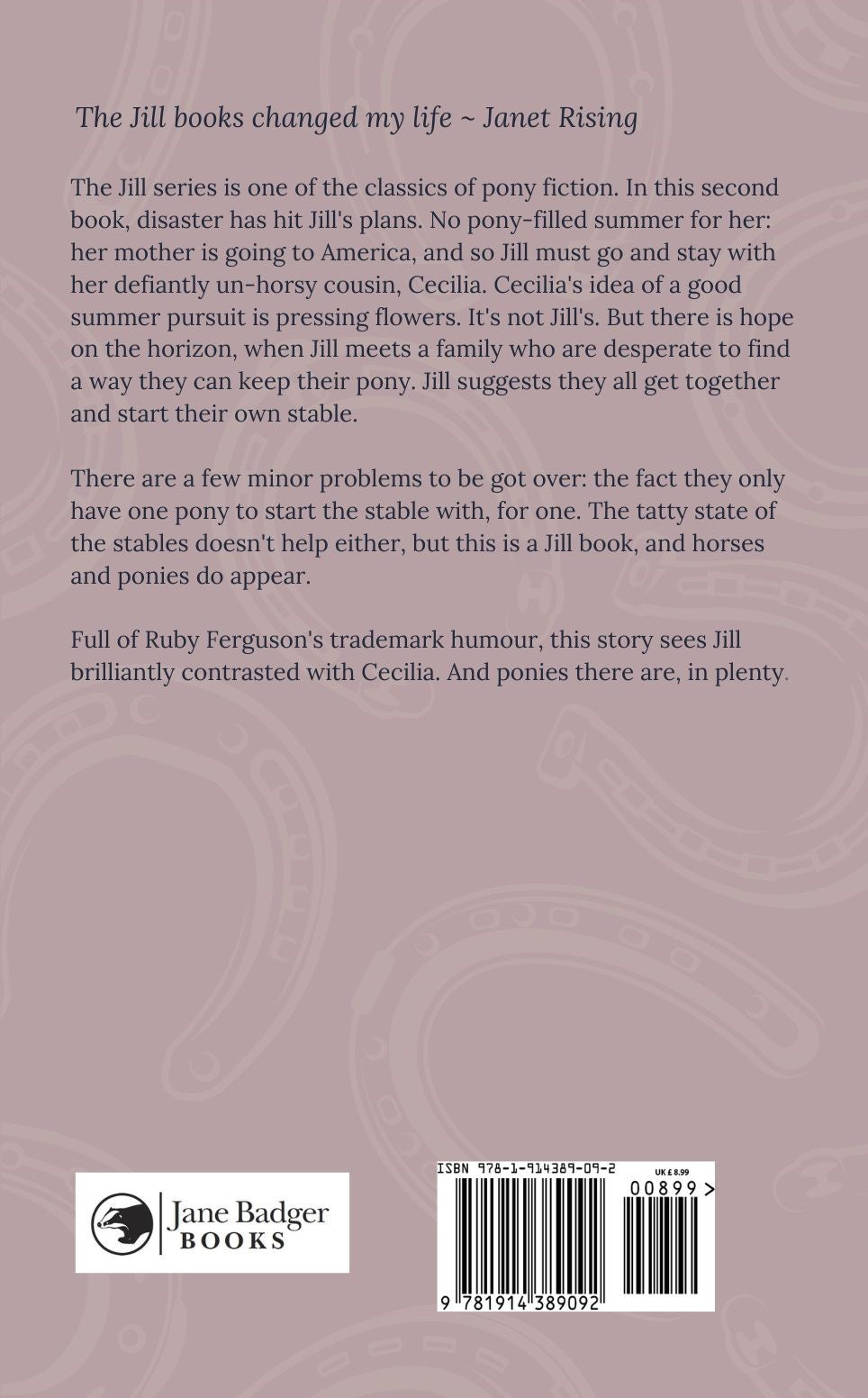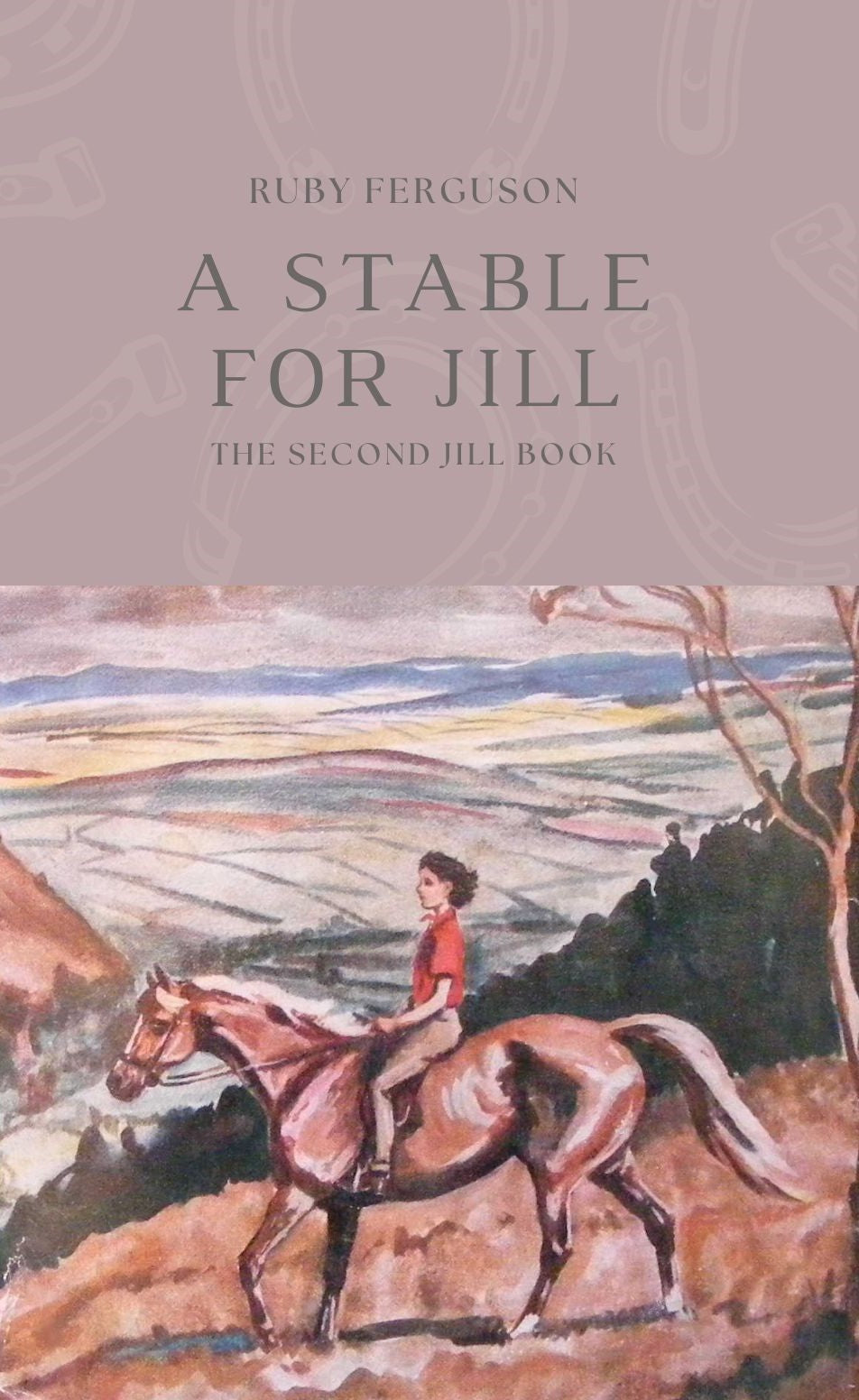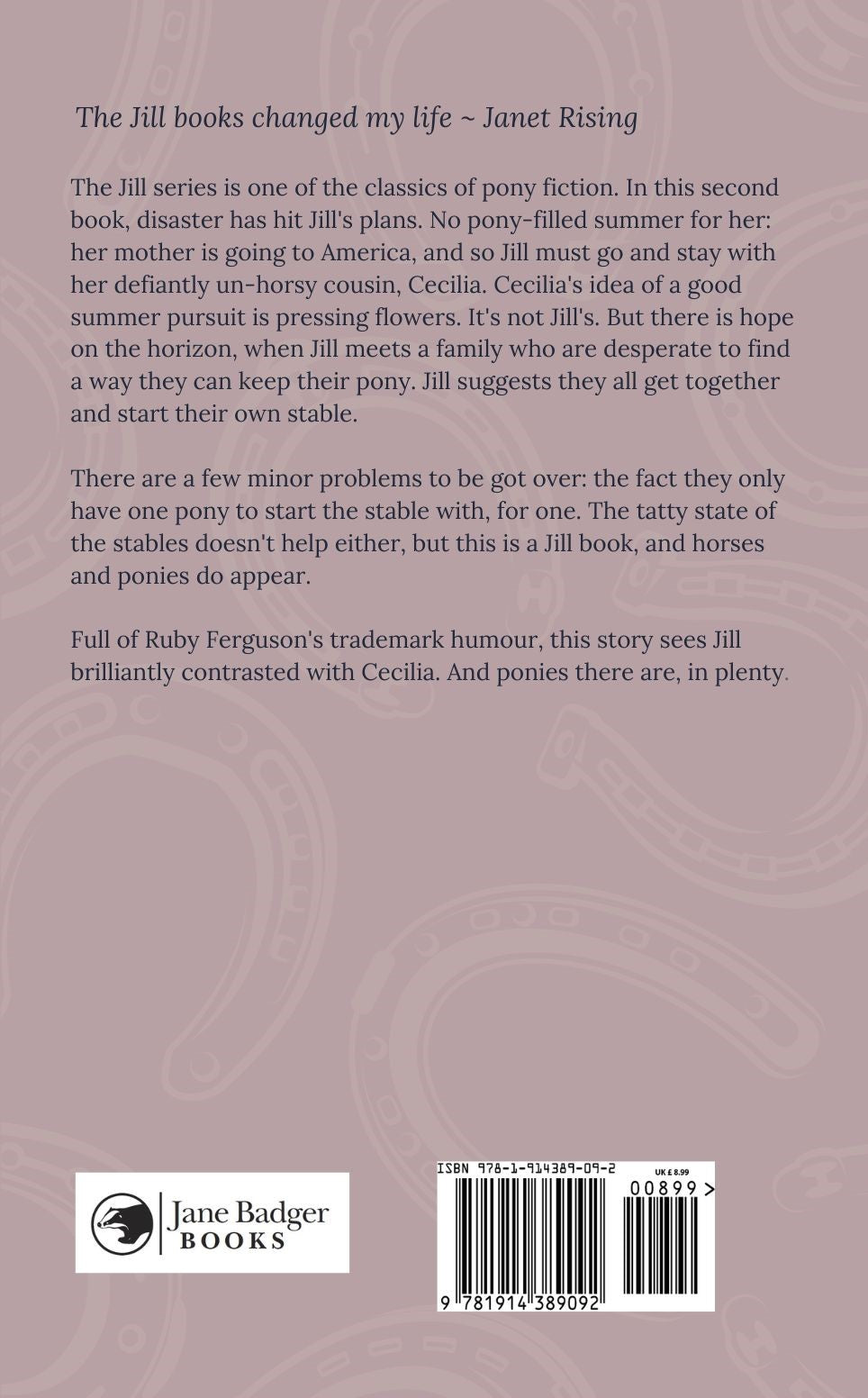Jane Badger Books
Ruby Ferguson: A Stable for Jill (paperback)
Ruby Ferguson: A Stable for Jill (paperback)
Illustrator:
Couldn't load pickup availability
Share
The Jill series is one of the classics of pony fiction. In this second book, disaster has hit Jill's plans. No pony-filled summer for her: her mother is going to America, and so Jill must go and stay with her defiantly un-horsy cousin, Cecilia. Cecilia's idea of a good summer pursuit is pressing flowers. It's not Jill's. But there is hope on the horizon, when Jill meets a family who are desperate to find a way they can keep their pony. Jill suggests they all get together and start their own stable.
There are a few minor problems to be got over: the fact they only have one pony to start the stable with, for one. The tatty state of the stables doesn't help either, but this is a Jill book, and horses and ponies do appear.
Full of Ruby Ferguson's trademark humour, this story sees Jill brilliantly contrasted with Cecilia. And ponies there are, in plenty.
NOTE: this book is not illustrated
Jill series 2
Page length:
Original publication date: 1951
When will I get my book?
When will I get my book?
Paperbacks are printed specially for you and sent out from our printer. They are on a 72-hour turnaround from order to being sent out. Actual delivery dates will vary depending on the shipping method you choose.
Read a sample
Read a sample
“HULLO!” I said to my friend Ann Derry as we met after school one afternoon. “How’s the Best Dressed Child feeling today?”
For answer she pulled the hair ribbon off my plait and threw it into the road where it was squashed flat by a passing car.
“You asked for it,” she said.
We were referring to an event which had just taken place in the village of Chatton where we live and where everybody rides and there are lots of pony shows and other horsy events such as I have described in my other book Jill’s Gymkhana.
A woman called Mrs. Beverley had had the bright idea of offering a special prize for the best dressed child rider, the idea being to add a bit of interest to the Rectory garden party in aid of mending the church steeple which it badly needed. Actually it was a frightfully silly sort of prize, but everybody seemed to get very excited over it. I decided not to compete myself, as the clothes I wear are adequate for the kind of riding I do but far from showy, but some of the girls at school and their mothers went simply crackers. For days people were talking about what they were going to wear, or else telling you it was a grim secret, and some girls’ mothers rushed them off to London to exclusive tailors who usually only make for the nobility. I should think the amount of money that was spent on those tailors would have built fourteen new steeples for the church, never mind repairing the old one.
There was a girl in our school called Susan Pyke, about whom I have told you in my other book, who said she was absolutely certain of getting the prize, which was distinctly off-putting for all the others if they had believed her, but nobody did.
My friend Ann told me rather apologetically that her mother was making her enter for this Best Dressed event, and knowing Mrs. Derry I wasn’t really surprised. Thank goodness my mother is much more sensible. I said to Ann, “Well, for heaven’s sake don’t let her get you up as Bonnie Prince Charlie or anything like that.”
Ann said no, she was simply having new cord breeches and boots and a covert coat and a new white shirt and string gloves and a bowler, and she wasn’t even trying because she thought the whole thing was absolutely potty and just the sort of thing that Mrs. Beverley—who turned out to be Susan Pyke’s aunt—would think of.
Well, when the competitors rode into the ring on the day it was terrific and more like a fancy dress parade than just child riders.
There was one girl got up in a Charles the Second huntswoman outfit, all flowing green velvet with ostrich feathers in her hat, which fell off the second time round the ring and the pony behind trod on it; and there was another wearing scarlet jodhpurs with a sort of white Hussar tunic, and then all this extra special hunting kit from the exclusive London tailors.
Everybody was gasping, and I was thoroughly enjoying myself and having a good laugh as I leaned over the rails, when Susan Pyke rode in.
She did look marvellous, all in black and with silver epaulettes and a silver stripe down her breeches, and her boots were actually patent leather and the whole thing was crowned with a woman’s hunting topper and she had gloves with enormous gauntlets like a Guardsman’s. She was riding her father’s black horse, Punch, which was 17 hands and much too big for her, and unfortunately she got on his neck and couldn’t get back again and then she lost her stirrups and after that she didn’t look so good and the judges lost interest in her.
I will say for the judges, they had good sense. In spite of it being such a silly prize they didn’t lose their heads and they weren’t impressed by all the glamour that people had put on. When my friend Ann Derry rode into the ring I couldn’t help feeling proud for she actually was without question the best dressed child rider that you could hope to see in the whole of England. And the judges knew it. Her pony, Seraphine, a grey, was beautifully groomed and Ann rode her with the utmost confidence. From head to foot she was perfectly and unobtrusively dressed, just right, and just as I should want to be dressed if I ever rode at Olympia or with the Quorn, which I never expect I shall do.
She so obviously deserved the prize that everybody clapped, and the judges gave it to her, and it was five pounds and a certificate. But after that I used to rag her by calling her the Best Dressed Child, which always got her goat.
It was the end of the summer term and we were having exams, which are always revolting but in this case were more revolting than usual as they had been devised by some fiend in human shape.
“What was your paper like?” yelled Ann as we whizzed down Orchard Road on our bikes.
“Sickening,” I said. “History. What was the Treaty of Utrecht?”
“Search me!” shouted Ann.
Then she turned off for her home and I went on to our cottage and burst into the kitchen and threw my school case on the floor. There was just time to saddle up and have a ride before supper.
Just then Mummy came into the kitchen with a letter in her hand and a strange look on her face. I knew at once that something was up though I do not claim to be physical, or whatever they call it.
“Gosh!” I said. “Is it good or bad?”
“I don’t know whether you’d call it good or bad, Jill,” she said. “But it’s rather terrific.”
My mother is very well known as a writer of children’s books, and I suppose some children must buy her books and read them—or else their aunts buy them for them for birthday presents to go in the bookcase—because simply huge numbers of them are sold and keep Mummy and me and the cottage and Black Boy, my pony, going; but the fact is I can’t get on with them at all, they are so whimsical, and the children in them, though considered sweet, are I think perfectly revolting.
“It’s books,” I said. “It’s another publisher wants another serial.”
“Oh no,” she said. “It’s much more than that. They want me to go to America for three months, to visit summer camps and tell stories to the children. They’ll pay all my expenses and give me a lot of money as well. What am I to say, Jill?”
“Why, you’ll go, of course,” I said promptly. “It’ll be marvellous for you, and I’ll be all right. It’ll be the summer holidays anyway, and I’ll make my meals when I feel like it and ride most of the day and dust every morning. It’ll be fun.”
“But you can’t possibly stay here by yourself,” said Mummy.
I knew that was coming. And I knew that however much I argued, Mummy wouldn’t change her mind.
“Oh,” I said, coldly. “What happens then?”
“That’s just the trouble. I hate to leave you, Jill, because I know you won’t like—”
“Not Cecilia’s!” I said. “Oh Mummy! How perfectly foul!”
Cecilia is my cousin and an absolute blot.
“I think I’d better not go to America,” said Mummy.
“Okay,” I said, and went out to the orchard where Black Boy, my pony, was waiting for me. He came to me at once and nuzzled my shoulder, making lovely snuffling noises from sheer pleasure. I stroked his neck and pretended to chew his forelock, and he said as plainly as anything, “Are we going to ride today?”
I knew I was being a beast, and I knew that it wouldn’t be a bit of good going on being a beast because I am not the kind of person that can be a beast and be happy at the same time.
So I went back to the house and put my head in at the door of the sitting-room where Mummy was sitting in front of her typewriter looking thoughtful, and I said, “You’ve jolly well got to go to America whatever happens, and I’ll even go to Cecilia’s. It can’t be worse than the dungeons under the Tower of London and people lived for years in them.”
“You are a dear,” said Mummy, smiling happily at me. “I do want to go. But, Jill, there’s something awful you haven’t thought of and I hardly dare say it—you won’t be able to take Black Boy to Cecilia’s. You’ll have to leave him at the riding school. Mrs. Darcy will be glad to have him and he’ll be well looked after and exercised.”
“But—but—” I stammered.
It was terrible. No Black Boy? No riding? I choked, and dashed up to my small bedroom. This was what you got for being noble. I was being noble about Mummy going to America, and I might just as well be going to a dungeon myself. On my chest of drawers were the cups I had won with Black Boy, and his rosettes made a gay pattern pinned over the mantelpiece, and I should miss the last two shows of the season and I had been nearly certain of winning the under fourteen jumping and next year I should be too old, and if you can think of anything more utterly dismal than that you don’t know anything about riding.
I did my level best to look on the Bright Side, only I honestly couldn’t find one to look on. There was a book of Mummy’s called Barbie Bright-Side about a girl who had both her legs cut off in a motor smash and got such a name for looking on the Bright Side that practically everybody in the town used to come to her and ask her to find a Bright Side for them too, and she always did.
“Gosh!” I said aloud. “If Barbie could find a Bright Side in this she ought to get the V.C.”
Because funnily enough it is always easier to see a Bright Side for other people than it is for yourself.
I am sorry this book is starting in such a melancholy way, but that is how things did start, though it will get a bit better later on if you can hang out so long.
Who's in the book?
Who's in the book?
Human:
Jill Crewe, Anne Derry, Catherine Crewe, Mrs Darcy, Aunt Primrose, Cecilia, Barbara, Patrick and Michael Walters
Equine:
Seraphine, Ballerina, Bungie, Mipsy, Dot, Begorra, Pedro
Other titles published as:
Other titles published as:
Series order
Series order
1. Jill's Gymkhana
2. A Stable for Jill
3. Jill Has Two Ponies
4. Jill Enjoys Her Ponies
5. Jill's Riding Club
6. Rosettes for Jill
7. Jill and the Perfect Pony
8. Pony Jobs for Jill
9. Jill's Pony Trek
Follow on:
Jane Badger: Jill and the Lost Ponies


Excellent service, very good quality paperbacks and delightful to revisit favourite books from my youth


